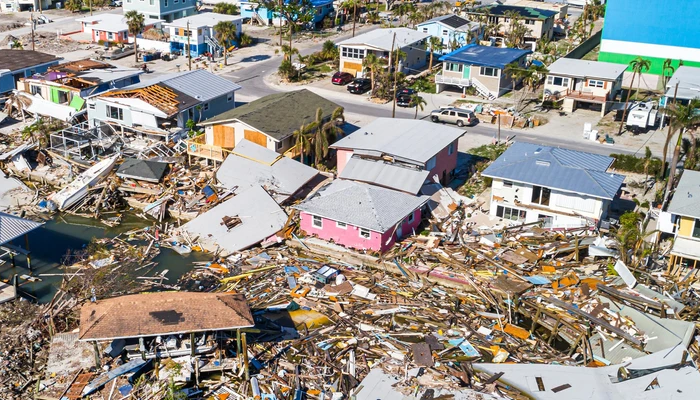
An aerial view of Ft. Myers Beach, Florida taken after Hurricane Ian shows homes, businesses, and property destroyed by the storm. (Photo: Jeffrey Greenberg/Universal Images Group via Getty Images)
London, December 28 (RHC)-- A faith-based coalition's annual report on the economic impact of climate-driven natural disasters revealed Tuesday that each of the costliest extreme weather events of 2022 caused more than $3 billion in damage.
The report—entitled Counting the Cost 2022: A Year of Climate Breakdown—was published by Christian Aid, a London-based relief agency of over 40 U.K. and Irish churches seeking more urgent climate action by Global North nations, which are most responsible for the greenhouse emissions that fuel global heating.
"Without major cuts in greenhouse gas emissions, this human and financial toll will only increase." The costliest disaster in this year's report, Hurricane Ian, struck Cuba and the southeastern United States, killing more than 150 people in both countries, causing around $100 billion in damage, and displacing 40,000 people.
Other major natural disasters covered in the report include the floods in Pakistan that killed over 1,700 people while displacing seven million others and causing $30 billion in economic damage, and the European drought and heatwave, which killed more than 1,000 people and cost around $20 billion.
The report's contributors note that most of the damage estimates are based solely on insured losses and that the true financial cost of each event is likely even higher. "The number of extreme weather events we have seen across the globe in both 2021 and again in 2022 should be a wake-up call to the international community," Newcastle University School of Engineering professor Hayley Fowler, who specializes in the impacts of climate change, said in a statement.
Christian Aid CEO Patrick Watt said that "having 10 separate climate disasters in the last year that each cost more than $3 billion points to the financial cost of inaction on the climate crisis." "But behind the dollar figures lie millions of stories of human loss and suffering," he added. "Without major cuts in greenhouse gas emissions, this human and financial toll will only increase."
Christian Aid said the report underscores the importance of urgent climate action, including the speedy implementation of the loss and damage fund recently agreed upon at the COP27 climate summit in Egypt. Described by proponents as a form of climate reparations, the fund will be financed by wealthy nations in order to help countries of the Global South—which are least responsible for the planetary emergency—mitigate climate impacts.
"The creation of the loss and damage fund at the COP27 climate summit was a huge breakthrough for people living on the frontlines of this crisis. This report shows just how badly it is needed and the urgency with which we need to see it up and running," said Nushrat Chowdhury, Christian Aid's climate justice policy adviser in Bangladesh. "The people flooded in Pakistan or victims of Cyclone Sitrang in my country of Bangladesh need this support to rebuild their lives."
"Many people in the Global South dealing with these disasters cannot afford insurance to cover their losses and they often can't rely on the state to act as a safety net," Chowdhury added. "The fact they have done almost nothing to cause the climate emergency is why it is so unfair they are left to suffer without support. We must see that change in 2023."

